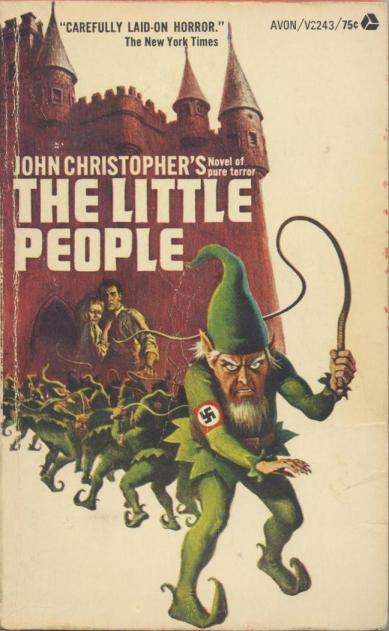I received this e-mail. Seems like a good time to stock up.
In This Email Monthly Review Sale Discounted AK Titles Forthcoming AK Titles Friends of AK Press Quick LinksAK Press - Home
New Titles at AK PressDirt Cheap Sale ItemsFriends of AK
Revolution by the Book (AK Blog)
Save on Monthly Review Books All Month!
We had so much fun with last month's Mayday Spectacular sale, we've decided to keep up the discounting action. So from now on, we're going feature a different publisher each month and put ALL their books on 25% discount for the whole month. That way you'll get a sense of all the great publishers we work with, and you'll save money at the same time! Doesn't that sound fun?
So, to kick things off, our featured publisher for the month of June is Monthly Review Press-an independent socialist publisher, and the publishing arm of Monthly Review magazine. They're known for their books on political economy, history, ecology, and labor, among many other essential topics.
Check out all the Monthly Review titles, in their discounted glory, or read on for a few highlights...
Monthly Review: Recent & Recommended [Image]The ABCs of the Economic Crisis: What Working People Need to KnowMichael D Yates & Fred Magdoff
Sale price: $8.96 (list price $11.95)
The economic crisis has created a host of problems for working people: collapsing wages, lost jobs, ruined pensions, and the anxiety that comes with not knowing what tomorrow will bring. Compounding all this is a lack of reliable information that speaks to the realities of workers. In this short, clear, and concise book, Fred Magdoff and Michael D. Yates explain the nature of the economic crisis as a normal and even expected outcome of a thoroughly irrational and destructive system. No amount of tinkering with capitalism can overcome the core contradiction of the system: the daily exploitation and degradation of the majority of the world's people by a tiny minority of business owners. This book is aimed primarily at working people, students, and activists, who want not just to understand the world but to change it.
For more background on the financial crisis from Monthly Review, see also The Great Financial Crisis.
[Image]Anarchism: From Theory To PracticeDaniel GuérinSale price: $10.50 (list price $14.00)
A classic introductory book on anarchism, with a strong Marxist flavor. Excellent both on the intellectual substance of anarchism and its actual practice through the Bolshevik Revolution, the Spanish Civil War, the Italian Factory Councils, and workers' self-management in Yugoslavia and Algeria. With an introduction by Noam Chomsky.
[Image]Discourse on Colonialism
Aimé CésaireSale price: $10.50 (list price $14.00)
Césaire's work, crucial to the anti-colonial struggles of the 50s and 60s, now haunts us again. His questions about the role of imperialism and slavery and of concepts like the "savage" or the "primitive" as central to the construction of "civilization," of the West and of progress remind us that the carnage in Africa, Asia, and the Americas which is our history is not past; it is lodged deep in the heart of Western cultures. As Césaire said, "It is equally necessary to decolonize our minds, our inner life, at the same time we decolonize society."
[Image]Eurocentrism: Modernity, Religion, and Democracy, A Critique of Eurocentrism and Culturalism
Samir AminSale price: $13.46 (list price $17.95)
Since its first publication twenty years ago, Eurocentrism has become a classic of radical thought. Written by one of the world's foremost political economists, this original and provocative essay takes on one of the great "ideological deformations" of our time. Rejecting the dominant Eurocentric view of world history, which narrowly and incorrectly posits a progression from the Greek and Roman classical world to Christian feudalism and the European capitalist system, Amin presents a sweeping reinterpretation that emphasizes the crucial historical role played by the Arab Islamic world. Throughout the work, Amin addresses a broad set of concerns, ranging from the ideological nature of scholastic metaphysics to the meanings and shortcomings of contemporary Islamic fundamentalism.
Also by Samir Amin, from Monthly Review: The World We Wish To See.
[Image]Open Veins of Latin America: Five Centuries of the Pillage of a ContinentEduardo Galeano Sale price: $13.50 (list price $18.00)
The best single volume on 500 years of exploitation and resistance of Latin America's "open veins." Rather than chronology, geography, or political successions, Galeano has organized the various facets of Latin American history according to the patterns of five centuries of exploitation. Weaving fact and imagery into a rich tapestry, Galeano fuses scientific analysis with the passions of a plundered and suffering people. This classic is now further honored by Isabel Allende's inspiring introduction.
For another Galeano classic from Monthly Review, check out Days and Nights of Love and War.
[Image]The Structural Crisis of CapitalIstván MészárosSale price: $20.21 (list price $26.95)
In this collection of trenchant essays and interviews, István Mészáros lays bare the exploitative structure of modern capitalism. He argues with great power that the world's economies are on a social and ecological precipice, and that unless we take decisive action to radically transform our societies we will find ourselves thrust headfirst into barbarism and environmental catastrophe. Mészáros, however, is no pessimist. He believes that the multiple crises of world capitalism will encourage the working class to demand center stage in the construction of a new system of production and distribution designed to meet human needs rather than serve the relentless pursuit of profit.
Also by István Mészáros, from Monthly Review: The Challenge and Burden of Historical Time.
[Image]The Taming of the American Crowd: From Stamp Riots to Shopping Sprees Al SandineSale price: $14.21 (list price $18.95)
The history of the United States has been largely shaped, for better or for worse, by the actions of large groups of people. Rioters on a village green, shoppers lurching about a labyrinthine mall, slaves packed into the dark hold of a ship, strikers assembling outside the factory gates, all have their place in the rich and sometimes tragic history of the American crowd. This unique study traces that history from the days of anti-colonial revolt to today's passive 'colonized crowds' that fill our sports arenas, commercial centers, and workplaces. In clear and lively prose, Al Sandine argues for role crowds have played in securing greater democracy, civil rights, and free speech. But he also investigates crowds in their more dangerous forms, such as lynch mobs and anti-immigrant riots.
[Image]When Media Goes to War: Hegemonic Discourse, Public Opinion, and the Limits of DissentAnthony DiMaggio Sale price: $14.21 (list price $18.95)
In this fresh and provocative book, Anthony DiMaggio uses the conflicts with Iraq and Iran as his touchstones to probe the sometimes fine line between news and propaganda. Using Gramsci's concept of hegemony and drawing upon the seminal works of Noam Chomsky, Edward Herman, and Robert McChesney, DiMaggio enlightens readers about issues essential to the struggle for a critical media and a functioning democracy. If our newspapers and television news programs play a decisive role in determining what we think, and if what the media give us is largely propaganda in support of an oppressive and undemocratic status quo, then it is incumbent upon us to make sure that they are responsive to the majority and not just the powerful and privileged few.
Also about the media, from Monthly Review: The Language of Empire, The Political Economy of Media, and The Problem of the Media.
Featured AK Press Titles: 50% Off! [Image]Each month we also bring you a new selection of featured AK Press backlist titles at an enticing 50% discount! Here are the new featured titles for June:
Black Flame: The Revolutionary Class Politics of Anarchism and Syndicalism, CounterPower Vol. I
Michael Schmidt & Lucien van der Walt
Sale price: $11.50 (list price $22.95)
Critical Mass: Bicycling's Defiant Celebration
Edited by Chris Carlsson
Sale price: $9.50 (list price $18.95)
1936: The Spanish Revolution
The Ex
Sale price: $12.50 (list price $24.95)
Igniting A Revolution: Voices in Defense of the Earth
Edited by Steven Best & Anthony J. Nocella II
Sale price: $11.00 (list price $21.95)
Real Utopia: Participatory Society for the 21st Century
Edited by Chris Spannos
Sale price: $11.00 (list price $21.95)
Anarchism in America DVD
Edited by Steven Fischler & Joel Sucher
Sale price: $10.00 (list price $19.95)
Forthcoming AK Press Titles: 25% Off! [Image]We've been busy around here lately, getting LOTS of new AK Press books sent off to the printer... and we hope you'll be as excited as we are about the results. Check out the next few books that are coming out from AK Press, and preorder yours today! We'll bill you and send your books as soon as they arrive in our warehouse from the printer.
Wasting Libby: The True Story of How the WR Grace Corporation Left a Montana Town to Die
Andrea Peacock
Preorder now for $11.95 (list price $15.95)
Dispersing Power: Social Movements as Anti-State Forces
Raul Zibechi
Preorder now for $11.95 (list price $15.95)
Uses of a Whirlwind: Movement, Movements, and Contemporary Radical Currents in the United States
Edited by Team Colors Collective
Preorder now for $14.95 (list price $19.95)
Sparking A Worldwide Energy Revolution: Social Struggles in the Transition to a Post-petrol World
Edited by Kolya Abramsky
Preorder now for $16.50 (list price $21.95)
Become a Friend of AK Press! [Image]Support anarchist publishing! To thank you for your monthly contribution of $25 or more, we'll send you a copy of every new AK Press title hot off the press—plus you'll get a 20% discount on anything we sell, anytime! With so many great titles at the printer, there's no time like the present to sign up as a Friend of AK.
Sign up now and get a stylish tote bag featuring the new Friends of AK logo designed by Josh MacPhee. If you're already a FoAK, just refer someone else, and if they mention you when they sign up, you'll both get a tote bag. And that's not all-if you keep referring more people after your first, you'll get a $20 AK Press gift certificate for each additional new FoAK you sign up!












